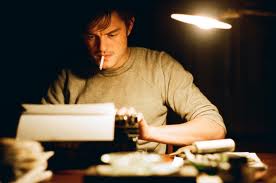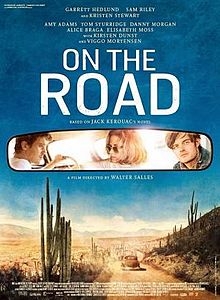 “The only people that ever interested me are … the mad ones…” Thus speaks Jack Kerouac’s literary alter-ego, Sal Paradise, in the opening moments of the autobiographic and rambling novel, On the Road, a literary Bible to those who worship the Beat Generation. These artistic and rambling scrawls of a hormone-fueled odyssey through post-World War II America blew open the way we view storytelling and ushered in a new form of storytelling and the near-death of tidy modernist thinking. It’s a big deal, so any film adaptation will invariably undergo the same rigorous and, perhaps, undeserved scrutiny that a film of any sacred document would endure. Fair enough, fellow critics. Draw your swords and prepare to wound any portion of this film that you deem to have violated the sacred text, but prepare to hear me call “BULLSHIT” on both your worship of the text and your purist view. I think you’re a bunch of corporate whores trying to kill an exciting and revolutionary film because your Disney-esque world-view is threatened. Jack Kerouac would piss on your shoes. You are not worthy. Who says I can’t write a negative review?
“The only people that ever interested me are … the mad ones…” Thus speaks Jack Kerouac’s literary alter-ego, Sal Paradise, in the opening moments of the autobiographic and rambling novel, On the Road, a literary Bible to those who worship the Beat Generation. These artistic and rambling scrawls of a hormone-fueled odyssey through post-World War II America blew open the way we view storytelling and ushered in a new form of storytelling and the near-death of tidy modernist thinking. It’s a big deal, so any film adaptation will invariably undergo the same rigorous and, perhaps, undeserved scrutiny that a film of any sacred document would endure. Fair enough, fellow critics. Draw your swords and prepare to wound any portion of this film that you deem to have violated the sacred text, but prepare to hear me call “BULLSHIT” on both your worship of the text and your purist view. I think you’re a bunch of corporate whores trying to kill an exciting and revolutionary film because your Disney-esque world-view is threatened. Jack Kerouac would piss on your shoes. You are not worthy. Who says I can’t write a negative review?
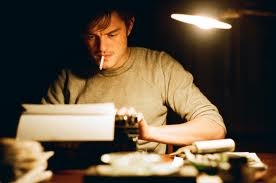 As for Walter Salles’ film adaptation, this film is kinda motherfuckin’ awesome! YOU NEED TO SEE IT! That is all! …Need more? Fair enough, Dear Reader, here are my thoughts: From the opening moments of narration of the gravelly voiced Sam Riley, this film had me by the balls. When the actor croaked, “the mad ones,” I was buckled in and ready for an adult version of the Magic Mountain ride. The acting in this film is uniformly good. Riley’s Sal/Jack is charming, accessible, and an innocent and horny tour guide for Uncle Kerouac’s Wild Ride. He has both the look of a choir boy about to be tainted, and the raunchy grin of a jaded teenager raised in a whore house. He’s a perfect choice for this part, as is Garrett Hedlund in an outrageously courageous performance as Neal Cassidy’s alter ego, Dean Moriarty. Hedlund does the ridiculous in capturing the free spirit of
As for Walter Salles’ film adaptation, this film is kinda motherfuckin’ awesome! YOU NEED TO SEE IT! That is all! …Need more? Fair enough, Dear Reader, here are my thoughts: From the opening moments of narration of the gravelly voiced Sam Riley, this film had me by the balls. When the actor croaked, “the mad ones,” I was buckled in and ready for an adult version of the Magic Mountain ride. The acting in this film is uniformly good. Riley’s Sal/Jack is charming, accessible, and an innocent and horny tour guide for Uncle Kerouac’s Wild Ride. He has both the look of a choir boy about to be tainted, and the raunchy grin of a jaded teenager raised in a whore house. He’s a perfect choice for this part, as is Garrett Hedlund in an outrageously courageous performance as Neal Cassidy’s alter ego, Dean Moriarty. Hedlund does the ridiculous in capturing the free spirit of 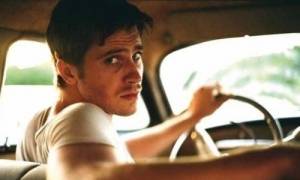 this generation. His dances are both hypnotic and bizarre, and his eager boyish entreatment for all of his fellow travelers to jump through the sexual rabbit hole is pitch-perfect. In a less prudish, and perhaps more importantly, less corporatized time, this performance would be touted for major award consideration. He just sort of jumps into the role and allows himself the risk of being humiliated, much like Brad Pitt did in his career-changing turn in 12 Monkeys. On the male side of actors, there’s also great work by Tom Sturridge as Allen Ginsberg’s counter-part, Carlo, and Steve Buscemi as a traveling salesman who could give a fuck about the farmer’s daughter, but might gladly bunk with his beefy, muscular nephew if the times were different.
this generation. His dances are both hypnotic and bizarre, and his eager boyish entreatment for all of his fellow travelers to jump through the sexual rabbit hole is pitch-perfect. In a less prudish, and perhaps more importantly, less corporatized time, this performance would be touted for major award consideration. He just sort of jumps into the role and allows himself the risk of being humiliated, much like Brad Pitt did in his career-changing turn in 12 Monkeys. On the male side of actors, there’s also great work by Tom Sturridge as Allen Ginsberg’s counter-part, Carlo, and Steve Buscemi as a traveling salesman who could give a fuck about the farmer’s daughter, but might gladly bunk with his beefy, muscular nephew if the times were different.
Okay here’s where the haters start hatin’, but the women are also pretty great! Amy Adams is almost unrecognizable in her cameo as a woman obsessed with bugs and blowjobs. Kirsten Dunst (not my favorite actress!) is appropriately white bread and icy as the second Mrs. Moriarty. And, here goes … Kristen Stewart is wonderful as the virgin/whore first wife, Mary Lou. She smiles. She dances. She has fun. She’s sexy, and not in the wooden, necrophilia way (if you know what I mean), but a legit sexy. I know I kinda hate myself for saying it, but she’s good! And if I were cast in a Stephanie Meyer film adaptation, I’d need to act lobotomized as well, so give her a chance and watch this film.
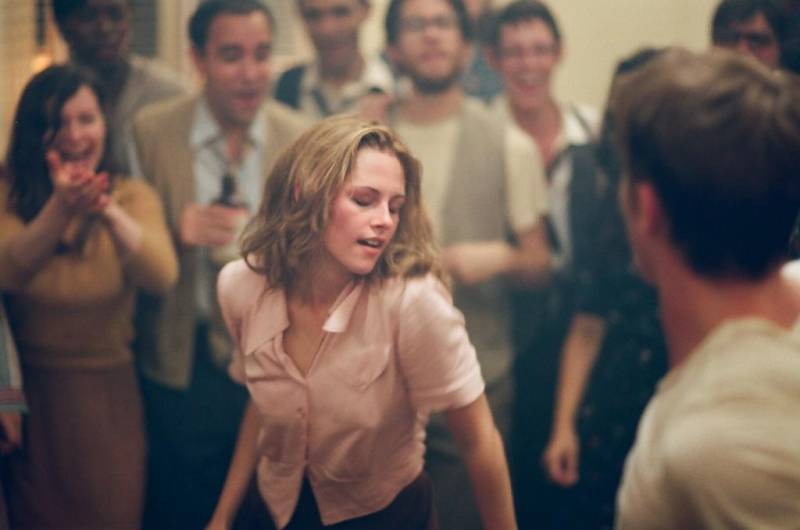
Why am I so jazzed here? The performances are solid, but the narrative is sort of haphazard and there are moments you have no idea who the people are that our heroes encounter and seek out (I have no idea who Amy Adams is herein, but I liked her!). The narrative is disjointed, that’s fair, but guess what, so is the novel! It careens through narration on Benzedrine and, thus, some fine points are lost. Also, the outings are pretty typical of average, aging adolescent behavior and lack depth. But guess what, so does the novel. It’s a young man’s experiment at fiction, and the resonance we assign it doesn’t always hold up in re-examination. Both the source material and the film are flawed in this way.
Still, the film’s art direction is truly gorgeous, like dropping ecstasy and jumping into an Edward Hopper painting. It’s a loving travel brochure of post-war America. More importantly, this film enjoys youth and presents an incredibly frank and pansexually sex positive attitude that few other film adaptations dare to show. Hedlund’s Moriarty will literally fuck anything with glee and wonder. He entreats others to join him. They do. Ultimately, his dalliance with Buscemi is the beginning of the end of his friendship with Riley’s Paradise.
Some people don’t want to stay in Wonderland, but in a world where corporations force feed us PG-13 garbage because they think kiddies might not see an R-rated flick, this film is a refreshing exploration of a multifaceted and judgment-free sexuality that is worthy of consideration of the grown-ups among us.
On the Road continues through Wednesday at the Art. Get out and see it.








